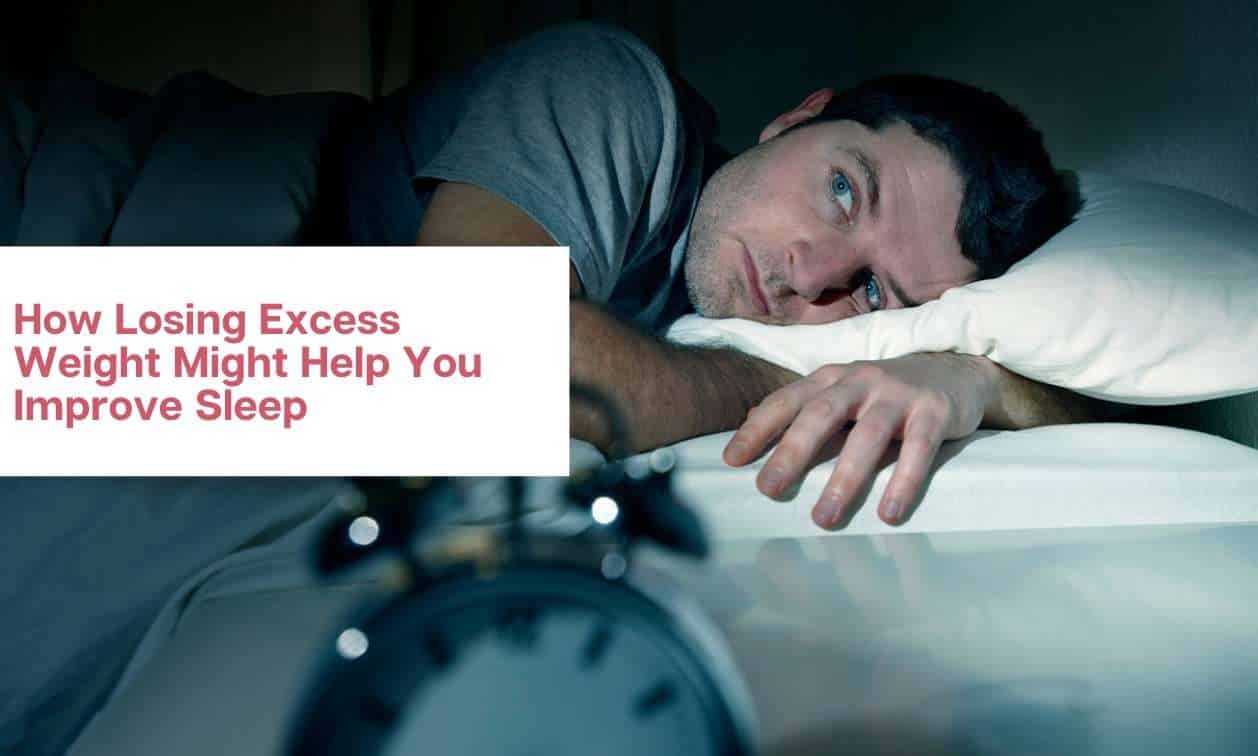
How Losing Excess Weight Might Help You Improve Sleep
Table of Contents
There is a definite link between being overweight and suffering from poor or disturbed sleep.
Getting a good night’s sleep is critical to maintaining a healthy weight. People who are overweight tend to have sleep issues. It is a relationship that goes both ways, as people with sleep issues also tend to put on weight more easily and have greater difficulty falling asleep. Why is this? What is the link between sleep and weight?
The relationship between obesity and sleep is sort of a medical “chicken and egg” scenario. We know that sleep loss adds to weight gain because of how poor sleep lowers metabolism and how lack of sleep leads to fatigue, making it harder to exercise. We also know that obesity can cause insomnia, excessive snoring, and obstructive sleep apnea – all of which result in disturbed sleep.
Regardless if your lack of sleep is causing your weight gain or if being overweight is negatively impacting your sleep, the good news is studies have shown that losing weight can improve sleep, and getting enough sleep can make it easier to lose weight.
How Being Overweight Affects Your Sleep
Generally speaking, lack of sleep can cause weight gain in three important ways:
- Poor sleep can lead to an imbalance in the hormones that regulate appetites and your ability to burn fat
- Poor sleep leads to daytime fatigue that can limit physical activity, causing weight gain
- Poor sleep increases appetite leading to excessive eating
Beyond that, individuals – particularly men who are overweight tend to suffer from several forms of sleep deprivation and conditions that can rob you of a good night’s sleep, including:
- Obstructive sleep apnea (OSA)
- Gastroesophageal reflux disease (GERD)
- Depression
- Asthma
- Osteoarthritis
Does the Lack of Sleep Increase Appetite?
As you can see, poor sleep and being overweight are intimately related. People with disturbed sleep tend to be overweight, and people who are overweight or obese are at a significantly greater risk of suffering from sleep apnea or other sleep disturbances.
Among the reasons why lack of sleep can lead to weight gain is that poor sleep can actually make you feel hungrier and cause increased eating.
Some of your body’s most important hormones are produced at the highest volume during periods of restful or deep sleep. These include the hormones most closely related to appetite and hunger, leptin and ghrelin. Leptin and ghrelin work together to let your body “know” when you are full or hungry, with leptin making you feel more satiated and ghrelin stimulating appetite.
Getting a good night’s sleep allows your body to best regulate these two hormones and keep a proper balance between being hungry and feeling satisfied. Insomnia or disturbed sleep can cause an imbalance that results in an increase in ghrelin levels and a corresponding decrease in leptin levels. This imbalance between the two “hunger hormones” can cause increased appetite during your waking hours leading to overeating.
Does Good Sleep Improve Metabolism?
Adequate sleep is necessary for regulating your metabolism.
Metabolism is basically how well your body burns calories for energy or stores them as fat. People with a high or good metabolism tend to be in shape; people with a “slow” metabolism do not burn fat efficiently and tend to be overweight.
Research has shown that lack of sleep negatively impacts the way your body converts sugar into energy rather than storing it as fat.
Getting good quality sleep can help keep your metabolic rate higher and reduce your risk of obesity and obesity-related diseases such as diabetes and heart disease.
How Weight Loss May Help You to Sleep Better
A slower metabolism, sleep apnea, GERD, and all of the conditions that can lead to poor or disturbed sleep can be reversed or eliminated by losing weight.
Getting in shape by making even small dietary and lifestyle changes can start to improve sleep, and as sleep improves, weight loss will itself become easier. Start simple by just reducing portion sizes, cutting out junk and processed foods, and eating a “heart-healthy diet with more fiber and vegetables – and you will likely see changes in your sleep patterns.
Can Hormone Replacement Help You to Lose Weight and Improve Sleep?
The link between lack of sleep and obesity has been well established. Interestingly enough, two critical hormones – testosterone and human growth hormone – that are closely related to weight and metabolism also play a major role in sleep.
Both testosterone and human growth hormone (HGH) play a critical role in your ability to burn fat and build muscle and are, therefore, closely linked to metabolism. As you age, their levels of both of these critical hormones declines.
This age-related hormone decline leads to a number of health issues, not the least of which is poor sleep and weight gain. Hormone replacement therapy has been shown to both improve sleep and raise metabolism, helping to lose weight.
Conclusion
Lack of good sleep and decreased levels of testosterone and human growth hormone is a vicious cycle. Both of these hormones are produced during periods of deep and restful sleep; however, low levels of each also make it difficult to sleep. Low levels of both HGH and testosterone slow your metabolism, which leads to weight gain, which only further exacerbates sleep problems, and so on and so on…
Therefore, it becomes almost impossible to lose weight for people who are suffering from age-related hormone loss and who are also overweight and suffering from sleep apnea or other sleep disorders.
However, hormone replacement therapy has been proven to break the cycle.
Testosterone replacement and growth hormone therapy can raise your metabolism and increase your ability to burn fat and build muscle. As you build muscle and burn fat, you will lose weight. As you lose weight, sleep will improve as well as your natural production of HGH and testosterone. So now, with hormone replacement, instead of a vicious cycle of poor sleep and weight gain – you will have created a positive biofeedback loop in which your sleep and metabolism will continue to improve.
In addition to weight loss and improved sleep, there are many more benefits of hormone replacement, including:
- Improved sex drive and sexual performance
- Improved energy
- Improved concentration and cognition
- Improved moods
- An overall improved level of fitness and quality of life

Frequently Asked Questions About Sleep and Obesity
How Much Weight Should I Lose to Improve Sleep?
Losing even a few pounds could lead to improved sleep. One study found that men who lost as little as six pounds saw reduced snoring, lessened symptoms of sleep apnea, and improved sleep. Of course, the more weight you lose, the better you sleep and the more improvements to overall health you will experience.
Can Weight Loss Improve Snoring?
People who are overweight tend to have excessive neck fat, which leads to snoring and obstructive sleep apnea. Losing weight can minimize this obesity-related airway constriction and can reduce snoring.

